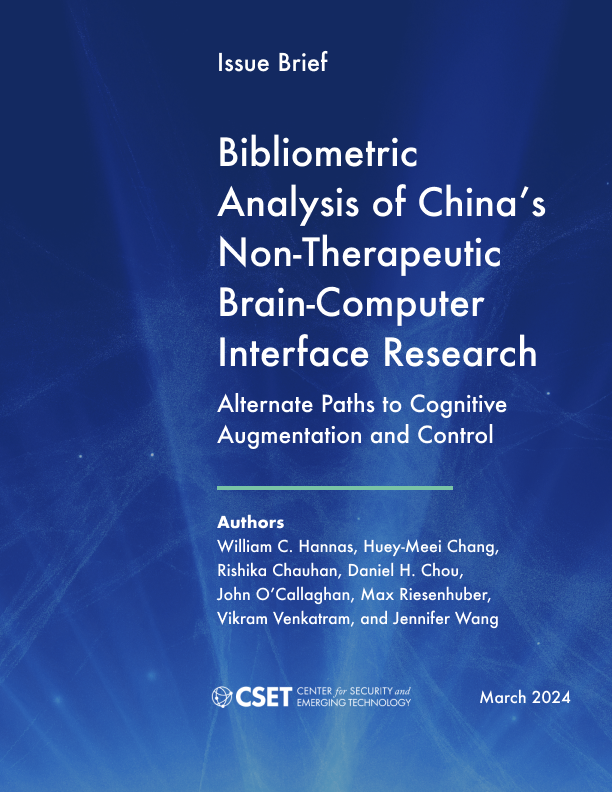Executive Summary
“Brain-computer (or brain-machine) interfaces” are a class of technology that allows direct communication between biological brains and computational resources, without the intervention of speech, tactile input, or the use of other sensory organs. Linkage is achieved through wires or wirelessly to contact points placed on the skull or inside the skull cavity. These interfaces—”BCIs”—have been used mainly to treat cognitive and neurological impairments.
With improvements in related technologies, however, it is now feasible to extend BCIs to the general population, potentially leading to a synthesis between the two types of intelligence—human and machine. This facilitated “merger” of natural and artificial cognition opens a path to a range of applications that could provide strategic advantages to early adopters—a prospect that has not been lost on China.
The present study reviews Chinese papers and patents for evidence of research consistent with the aspirations of Chinese scientists—captured in prior CSET studies—to build toward this state of BCI-enabled cognitive enhancement. A bibliometric analysis of several hundreds of Chinese documents indicates China embraces this goal and has realistic pathways to achieve it. China’s research in non-invasive and invasive BCI is at the world-class level thanks to indigenous work across the spectrum of related disciplines and China’s ability to benchmark foreign designs.
Although collaboration with foreign and, especially, U.S. experts accounts for part of China’s success, the analysis shows that global input to Chinese BCI programs accounts for a small and diminishing volume of the research, as evidenced in coauthorship patterns.
The study begins with an account of its assumptions and methods, followed by details on the institutions and people that our analysis indicates are most likely to achieve breakthroughs in non-therapeutic BCI in China. Medical uses of brain-computer interfaces, while not part of the study’s focus, are cited where needed since they underpin much of China’s BCI research.
Readers short on time can skip the preliminary sections and go directly to “Expert Assessments” for an overview of the paper’s substantive findings, which are: Chinese scientists are researching with measured success a variety of BCI technologies and applications, with an emphasis on signal processing, new materials, and detecting cognitive and emotional states. These efforts are comparable in sophistication to those in the United States and the United Kingdom and position China to achieve a soughtafter merger of human and machine intelligence.
This study is a joint effort by analysts at Georgetown University’s Center for Security and Emerging Technology and King’s College London’s Department of War Studies. It is based wholly on Chinese open sources and benefits from insights provided by neuroscience experts. The paper recommends an open-source monitoring program be established to track China’s development of BCIs in the interest of national security and safety.
